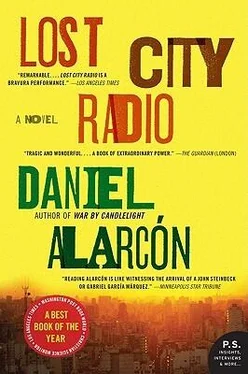They were drinking instant coffee in the conference room: the sun was setting, the mountains and the city below shone orange. Norma had a beleaguered look to her; her day was just beginning. She slept in the mornings now: a few days into her internment, the station director, at Elmer’s suggestion, decided to put her on the air overnight. Yerevan’s slot had to be filled. “It’s not like you’re sleeping well,” Elmer had said, and it was decided. These were the dead hours of radio, but, to everyone’s surprise, Norma had been inundated with calls, requests, advice, gossip. She played mostly romantic songs and, in between, let the people talk freely. The night before, as Rey prepared for bed in the empty apartment, he had listened to his wife’s voice and then dreamed of her. It was beautiful, narcotic, lulling, and he wasn’t the only one who thought so.
“It’s lonely here,” Norma said. “The entire place is empty. Just me and the watchman.”
“And the callers.”
She sighed. “And the callers.”
He took her hands in his. “They love you.”
“Can you stay?”
Her on-air shift ran from eleven to four in the morning, so Rey had time to go home and change before her show began. He made dinner for both of them, prepared an overnight bag, locked up the apartment, and was back at the radio at ten-thirty. The station was already desolate. They drank more coffee, strong and sugarless, and Rey could tell she was happy to have him around. A few minutes before eleven, they went to the control room, chatted for a few minutes with the evening host. He was short and thin, an awkward, prematurely white-haired man who had always had a crush on Norma. When he had packed his things and left, and they were alone, Norma threw her arms around Rey’s neck. An old ballad played, the record slightly warbled, the guitars falling in and out of tune. She kissed him. By the time the record ended, they were both unclothed and laughing. Norma strode across the studio, picked up the needle, and let the song play two more times before she began her show.
IT WAS a gift to be able to separate so thoroughly the two halves of his life. When he was home in the city, he rarely thought of the jungle, except in an academic sense: the mysteries of plant life, the demands of the climate, human adaptation to its exigencies. Sometimes an image from the cool heart of the forest: the mossy black trunk of an ancient tree, the white stones along the river’s edge, water-carved into the most fantastical shapes — and this was all. Not the people he knew there, or the woman who had beguiled him. His trips to the rain forest included a similar kind of disassociation: an hour or two outside the city, when the raw and disordered slums had disappeared and the road wove up into the still-uninhabited hills, Rey felt himself cleansed of worldly responsibilities, going backwards in time, a man returning to a more innocent and purer state. Outside the city, he never went by Rey. So complete was his transformation that the sound of his own name, his city name, had no effect on him beyond the limits of the capital.
He made his first trip to the jungle soon after returning to the university. It was a purely scientific expedition, before Trini’s murder changed his mind, a trip made under the guidance of a potbellied old professor who spoke three Indian dialects and walked the halls of the university chewing medicinal roots. The students were charged with writing technical descriptions of plants they found — about the sticky texture of the leaves or their acid smell — and they pressed samples into the pages of heavy books that the professor had brought for this very purpose. The jungle had seemed to Rey, from books, from conversations, from photographs, to be the exact opposite of the city where he had lived since he was fourteen. Uncharted and unknowable, a universe where the rules were still being ironed out and fought over, it was the frontier, and its draw was powerful. This was the first year of the war. Later, when Elijah Manau traveled the same paths, the jungle was already part of the nation — there were schools and roads maintained, at least in theory, by the state — but when Rey went for the first time, travel involved riding atop a truck or bartering with a villager for a canoe ride along the muddy rivers. They encountered natives, who spoke only their own impossible language. They washed in sweet-water rivers, and slept in hammocks, and instead of sleeping, Rey would stay up, eyes closed, listening to the rising and ebbing sounds of the forest, certain it was the most beautiful place he had ever heard.
The land belonged to whoever claimed it, and in those days especially, the dense forest was an ideal place to disappear, to hide from the eyes of the law. As the war progressed, the government would learn to keep an eye on those who came and went from the nation’s jungle regions. There were men who moved weapons and men who transported drugs. There were money men who bribed police officers or army captains or village chiefs. There were scouts who cased bridges for bombing, and men who pretended to be loggers or traders or even wandering musicians. And there were men like Rey, who left the city as credentialed students or scholars and who, somewhere along the way, became other people, with other names. These were men who never carried guns, men charged with something much more valuable: information.
He never saw Marden again. But by the time of the Yerevan episode, Rey and the man in the wrinkled suit had been seeing each other, off and on, for almost nine years, like furtive lovers: nine years of meetings at bus stops, of purposefully vague conversations and random duties, enough for Rey to come to know his contact, insofar as one could know a man like that. He came to recognize the man’s muted expressions of worry, the way his weight fluctuated with the intensity of the conflict. There were times when Rey’s contact looked positively ill, with unshaven, sunken cheeks, slack expressions, and unruly hair. As an agent, he was frighteningly transparent: days later, something, somewhere in the city, exploded, and by the next meeting, Rey’s contact had regained some air of calm. Then it began again. In nine years, they had even met socially, at various dinner parties where they had been introduced as strangers and played the part convincingly, exchanging a few polite words before studiously ignoring each other for the rest of the evening. Even Norma had shaken his hand once or twice; had commented, after a party, as she undressed in the blue darkness of their apartment, on the coldness of Rey’s contact, his unfriendly, unsmiling greeting. Rey felt compelled to defend him, but of course, he did not: he pretended not to recall — what was his name again? They were even colleagues of a sort: in different fields, at different universities. After the first Great Blackout, which had taken Rey and the entire city by surprise, their meetings were monthly, and the tasks so mundane it was possible for Rey to believe the war had nothing whatsoever to do with him. He left envelopes in trash cans, wore a bright red shirt and sat in a windowed café at an appointed time, or made calls to pay phones, never saying much more than an address to whoever picked up on the other end. His days as a well-known student leader were long past. He was invisible now. After returning from the Moon, he had never again made a speech, or spoken of politics in public, save for his aborted confession in the darkened bar the night of the first Great Blackout. Besides the man in the wrinkled suit, Rey knew nobody in the city who was involved. He had been as surprised as anyone to discover that Yerevan was a sympathizer. For years, Rey had thought of the war and his own involvement in it as an intimate act. Of course, he knew there were other people participating, but he never thought of them, never wondered who they were, felt no kinship with these mysterious and invisible allies. He didn’t read the paper much, except for sports, and gleaned what he knew of the war’s progress from the increasing militarization of the city streets. And he went home each night to Norma, who had decided to believe her husband kept no secrets.
Читать дальше












